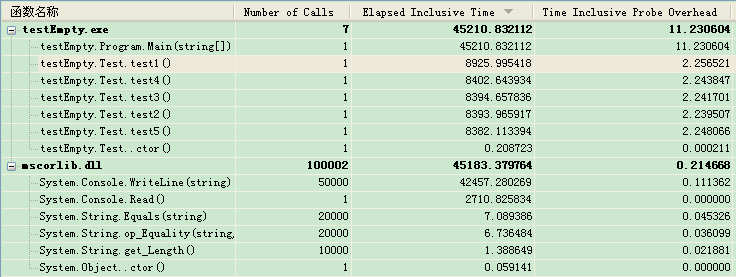关于字符串为空的几个性能测试
今天突然有兴做了两下有关字符串为空的性能测试,与大家分享!结果如下:
两种赋值方式的比较:
string str="";
string str=string.Empty;
理论上讲:
string.Empty是一个Static的属性,使用时不分配存储空间,而在用""时,系统会分配一个长度为空的存储空间。不过编译系统应该会优化,也就是说,比如你程序中有10个地方用到了"",但好的编译系统应该引用的是同一个对象。所以用""也就是浪费一个对象空间而已。
实战:
测试程序如下:
namespace testEmpty
{
class Program
{
static void Main(string[] args)
{
Test test = new Test();
test.testEmpty();
test.testEqualEmpty();
Console.Read();
}
}
class Test
{
public void testEmpty()
{
string str;
for (int i = 0; i < 10000; i++)
{
str = "";
}
}
public void testEqualEmpty()
{
string str;
for (int i = 0; i < 10000; i++)
{
str = string.Empty;
}
}
}
}
测试过程是分别将赋值语句str=""和str=string.Empty用两个函数执行10000次,所用时间如下所示:

所以说:单独执行testEmpty()执行10000次用了0.262669毫秒,单独执行testEqualEmpty()执行0.026849毫秒。前者是后者的10倍.
下面介绍的是几种判断语句的比较:
我想到的所有的判断空字符串的语句就这几种了,大家还有其它方法的欢迎讨论!
str == ""
str.Equals("")
str==string.Empty
str.Equals(string.Empty)
str .Length==0
测试程序如下:
using System;
using System.Collections.Generic;
using System.Text;
namespace testEmpty
{
class Program
{
static void Main(string[] args)
{
Test test = new Test();
test.test1();
test.test2();
test.test3();
test.test4();
test.test5();
Console.Read();
}
}
class Test
{
string str = string.Empty;
public void test1()
{
for (int i = 0; i < 10000; i++)
{
if (str == "")
{
Console.WriteLine("1 This string is emput");
}
}
}
public void test2()
{
for (int i = 0; i < 10000; i++)
{
if (str.Equals(""))
{
Console.WriteLine("2 This string is emput");
}
}
}
public void test3()
{
for (int i = 0; i < 10000; i++)
{
if (str==string.Empty)
{
Console.WriteLine("3 This string is emput");
}
}
}
public void test4()
{
for (int i = 0; i < 10000; i++)
{
if (str.Equals(string.Empty))
{
Console.WriteLine("4 This string is emput");
}
}
}
public void test5()
{
for (int i = 0; i < 10000; i++)
{
if (str .Length==0)
{
Console.WriteLine("5 This string is emput");
}
}
}
}
}
在这个测试程序中,用了5个分别含有这5种判断语句的方法,目的就是为了测试每个方法耗费的时间。
在这里说明一下,笔者在这个程序中起的名字不可取,程序员不应该这样为方法起名字的,见笑了!
测试结果如下:

呵呵,可以从这个方法耗费时间详细说明表中看出,这些方法耗费时间都比较,这主要是因为里面的Console.WriteLine()语句影响的。但是每个方法中都有这一语句,所以说它并不影响我们的比较结果!
得出的结论:在字符串为空时,这五种判断语句的耗费时间由短到长
str .Length==0
str.Equals("")
str==string.Empty
str.Equals(string.Empty)
str == ""
你平时有的哪种比较语句呢?呵呵……
需要说明的是:这只是在字符串为空时结果是这样的,那么字符串不为空时呢,结果又是怎样的呢?
©2007 renly
原创作品,欢迎转载,转载请注明出自博客园,留此信息!


 浙公网安备 33010602011771号
浙公网安备 33010602011771号